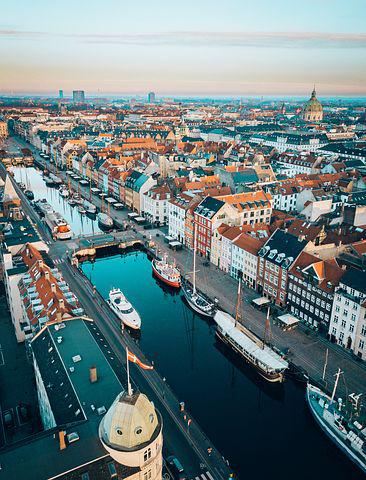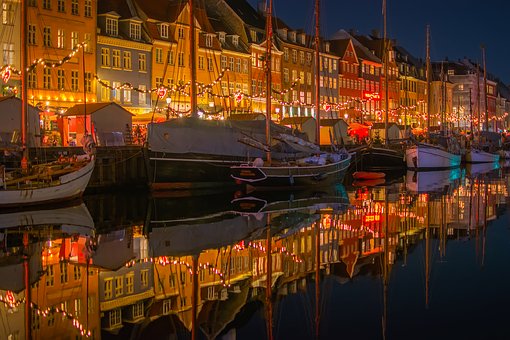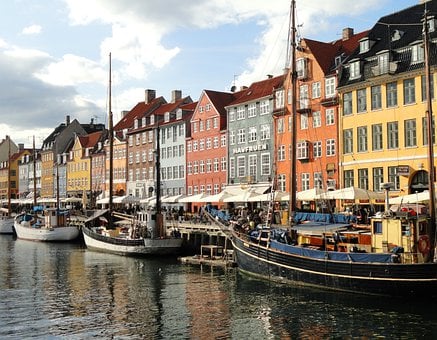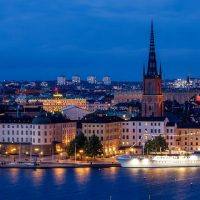Denmark is home to all sorts of beautiful landmarks.
They are the home of such inventions as LEGO and Google Maps.
Plus, they are known for having a government that provides so much for its residents.
If you have decided to move from your home country, it is important to explore Denmark, including the pros and the cons.
This way, you can decide if it is the right place for you.

Contents
Pros of Living in Denmark
Denmark has a lot to offer, so you will find that there are plenty of pros to living in this beautiful country, whether it’s in a major city or in the countryside.
1. You Will Work Less
There is an emphasis on achieving a desirable work-life balance.
In comparison to Americans, Danes work considerably less.
This includes not only the number of hours worked per week but also the number of vacation days that are given every year.
Companies focus more heavily on productivity within the workday and less on the number of hours that everyone actually works.
It helps to establish the concept of working to live instead of living to work.
2. There’s Free Education
Education in Denmark is free.
This goes above and beyond K-12 grades.
You can earn a college education at no cost.
Technically, the cost is incorporated within the taxes that you pay.
However, it takes the burden off having to deal with college loans.
It also ensures that everyone has valuable skills that will help them to become employed by a good company.
3. It’s a Safe Place to Live
Denmark is consistently rated as one of the safest places to live.
There is very little crime, which allows you to walk safely day and night without fear of a crime being committed.
Gun violence is almost unheard of, in comparison to what you might be used to in the U.S.
It is also one of the reasons why Denmark ranks as one of the happiest places to live.
4. Public Health Care is Abundant
The state pays for all levels of public health care in Denmark.
This includes everything from annual doctor visits to ambulatory care.
Even meals-on-wheels programs and elderly care are paid for by the government.
It is also why there are so many healthy and happy people throughout the country.
You will not have to spend money on anything pertaining to healthcare, and that includes surgeries and prescription medications.
5. Public Transportation is Everywhere
Denmark has invested heavily in public transport.
You will find a comprehensive network of routes that will take you in and out of the country – and everywhere throughout Scandinavia that you want to go.
You will notice that buses and trains are clean, roads are well-maintained, and there are even plenty of bicycle lanes for when you want to cycle your way to work or to a store.
6. Lots of Green, Outdoor Spaces
Denmark does a great job of maintaining its parks and outdoor spaces.
There is always somewhere to go to enjoy the great outdoors – and there are also hundreds of islands that you can explore.
Plus, the water is crystal clear, so it is no wonder why so many people live near the coastal cities.
7. Rent is More Affordable
Rent is more affordable in Denmark in comparison to the U.S. Most of the apartments or flats come completely unfurnished.
The square footage is smaller than what you may be used to in other parts of the world, but the cost can be nearly half.
Of course, the closer you are to a city center, the more expensive the rent will be.
8. Childcare is Affordable
The Danish welfare system subsidizes the cost of daycare, which makes it easy for both parents to work.
There are daycare centers as well as in-home daycare that is covered.
A quarterly stipend is received per child all the way until a child reaches 18.
While the money can be used in various ways, it is designed to offset childcare costs.
9. You’re Close to Many European Cities
Copenhagen is a common cruise port, which can whisk you away to other parts of Europe including Italy and Spain.
Additionally, you are extremely close to both Sweden and Germany.
You will have the ability to find affordable flights out of the country.
There are also train routes that will take you to Berlin, London, Paris, and more.
It can make it that much more enjoyable (and affordable) to travel and soak up the culture that Europe has to offer.
Cons of Living in Denmark
Denmark is just like every other country – there are downsides to living there.
Before you assume that the grass is greener in another country, take a look at some of the cons to living in the Scandinavian country.
1. Cost of Living is High
You will need to either earn a lot of money or have a decent amount of money in savings to be able to afford to live in Denmark.
The cost of living is high, and much of that has to do with the high taxes.
Nearly every aspect of Denmark is more expensive – restaurants, groceries, utilities, clothing, and more.
The cost of living index in Denmark is higher than in the U.S., the UK, France, Italy, and other places around the globe.
2. Going Out to Eat is Expensive
Going out to restaurants, even the “inexpensive” ones can be expensive throughout Denmark – and more so in the larger cities such as Copenhagen.
On average, the cost at a mid-range restaurant is 26% more expensive than it would be in the United States.
It is why many people only choose to go out to restaurants for special occasions.
3. Danish is a Hard Language to Learn
While many people in Denmark speak English, at some point you’ll find that it is necessary to learn the language.
It is difficult to learn because of the high number of vowels – English has 10 vowel sounds and Danish uses 20.
The language is also spoken extremely quickly using a monotone sound.
It can be difficult to understand, especially when you’re used to a language that uses more intonation.
4. Fuel is High
The cost of fuel is almost double what it is in the United States.
As such, many people will use public transportation as a way to go long distances.
It is common for people in Denmark to have bus and/or train passes for a month or longer.
When you do have to drive somewhere, you will need to prepare yourself for the higher fuel costs, which can add a significant amount to your travel budget.
5. The Weather is a Challenge
Denmark has weather that is similar to the rest of Scandinavia.
It is cold and dark for a large part of the year.
In the summer, it may be hot and sunny, but that is not always a guarantee.
You will want to get used to a grey and cloudy atmosphere – and it tends to rain a lot.
The northern location, similar to Alaska, does not get a lot of sunlight, so you will find yourself deficient in Vitamin D if you are not careful.
6. It Can Be Difficult to Obtain a Visa
If you want to live and work in Denmark, you will find that it can be difficult to obtain a visa.
You will have to start the process early on and have a good reason for why you want to make the country your home.
EU and EEAA citizens are the only ones who can live in Denmark without a visa.
If you are an ex-pat from the U.S. or anywhere else, you will have to explore the visa process and follow a long list of steps.
7. It’s Common to Drink Heavily
It is common to see the Danish drinking.
The dark winter months often have people gathering in bars and pubs.
Getting drunk in public is normalized, and it is not uncommon to see people stumble out of bars at 7 in the evening or earlier.
Heavy drinking is considered socially acceptable, so it can be difficult to get into this habit.
If you are a recovering alcoholic, it may also be hard for you to find friends as many friendships are formed over drinks.
8. Making Friends Can Be Difficult
Making friends can be extremely difficult for a number of reasons.
First, many people who are non-Danish are ex-pats.
They will travel from country to country after a few years.
So, even if you do make friends with people who are just like you, they are likely to move away in a year or two.
Second, many Danes will make lasting friendships in primary school.
As a result, they have their friendships and are hesitant to look outside of their social circles to make new friends later in life.

Pros and Cons of Living in Denmark – Summary Table
| Pros of Living in Denmark | Cons of Living in Denmark |
|---|---|
| 1. You Will Work Less | 1. Cost of Living is High |
| 2. There’s Free Education | 2. Going Out to Eat is Expensive |
| 3. It’s a Safe Place to Live | 3. Danish is a Hard Language to Learn |
| 4. Public Health Care is Abundant | 4. Fuel is High |
| 5. Public Transportation is Everywhere | 5. The Weather is a Challenge |
| 6. Lots of Green, Outdoor Spaces | 6. It Can Be Difficult to Obtain a Visa |
| 7. Rent is More Affordable | 7. It’s Common to Drink Heavily |
| 8. Childcare is Affordable | 8. Making Friends Can Be Difficult |
| 9. You’re Close to Many European Cities |
Denmark Safety Overview
READ THE FULL REPORT: Denmark Safety Review
Safety Index:
- OVERALL RISK: LOW
- TRANSPORT & TAXIS RISK: LOW
- PICKPOCKETS RISK: LOW
- NATURAL DISASTERS RISK: LOW
- MUGGING RISK: LOW
- TERRORISM RISK: MEDIUM
- SCAMS RISK: LOW
- WOMEN TRAVELERS RISK: LOW
Frequently Asked Questions
What is the official “work week” in Denmark?
The number of hours that makes up an official work week in Denmark is 37, which is three less than the 40-hour average in the United States.
What is the amount of standard vacation time given in Denmark?
Long summer vacations are legally required.
The average employer will provide you with at least five weeks of paid vacation per year.
It is expected that you will take at least six weeks off throughout the year.
What is the currency in Denmark?
Denmark uses the currency of the Krone (DKK) which is accepted only in Denmark, Greenland, and the Faroe Islands.
When you travel in Europe, you will need to convert to the Euro on many occasions.
Are the taxes high in Denmark?
The taxes are extremely high in Denmark compared to other parts of the world.
There’s a 25% VAT.
In total, Danes will typically pay approximately 45% of their income to the government.
The good news is that there are a lot of things provided for free to compensate for the high taxes.
What is the most common form of transportation in Denmark?
Due to high fuel costs, cycling is the primary form of transportation for most Danes.
It is affordable and easy to get to where you need to go.
Nine out of 10 Danes own a bicycle, and even when you are visiting, bicycles are available for rent in most cities.












Denmark living (or just visiting) is generally very pleasurable. Although people are friendly they should rev up their warmth level. We (Americans) won’t bite you, just want to talk about silly things, like the weather or the cool style of your coat to strangers.
Danes don’t like small talk and you are rude trying to change people into fake small talk loving Americans. Stay in the US, please.
You might want to stay in Denmark too. I wouldn’t want you to go visit another country and have someone look at you the way you view americans.
Having lived in Denmark and Sweden for a significant amount of time ( 10 years) and having had a job there in a prestigious organization ( and speaking the languages) I can say that Scandinavian societies, for all their quite significant perks, are extremely closed and not socially open to foreigners.
It doesn’t mean anything if society “functions” well ( to be debated in many areas), if the people are cold and not willing to incorporate you into their existence. It is extremely difficult to make friends in Scandinavia- and one can be very lonely. Also, there is a lot of “Big brother” control not for the best, and a fair amount of far-right aggression.
Having lived in Denmark I can tell you that prescription medications are not free here, we have to pay for them. And unlike other countries, the employers don’t offer health plans to cover prescription medication, dentists or eye doctors. The health care offered is mediocre, most other western countries (with the exception of the United States) provide similar levels of health care to their citizens, but the other countries do not tax their citizens at such a high level.
I am Danish and lived in the country until I was 29. Now I live in the US. Prescription medication is heavily subsidized, but you have to pay for medication. I was glad that my healthcare was not dependent on the goodwill of an employer. In the US you lose your healthcare if you lose your job. Sorry, but in my opinion healthcare in Denmark is not mediocre, and nobody has to worry whether they can afford surgery or not like here where fewer and fewer employers offer good healthcare. Also, many plans have huge deductibles in the US. I am retired and pay approx $400.00 per month for Medicare plus a supplemental plan. My husband pays the same. In Denmark I would pay nothing plus I would receive both the Danish social pension plus the social security earned through my work.
Why do you live in the US?
Lisa,
Ulla is just simply stating the facts and differences between the countries.
There may be other reasons why she lives in States, but healthcare is not one of them.
My wife and I are also retired, however, the cost out of pocket is low. Similarly to Ulla, we moved to the US when were straight out of college. Now 42 years later it may be hard to move back. Where all my life I spend here. My kids were born here.
Europe has great social programs, free health care, not drugs (you pay 33%), and free transportation in cities for older citizens.
Have been living in DK for more than 7 years, and I can say that it is NOT a nice place to live. It’s a nice place to work, study, or maybe get your medicines. But when you are out frok work, or school, that’s it:
Its hard to make friends (I have one danish friend)
Its very difficult to move around in public transport (unless you are in cph area)
If you don’t know danish and you would like to find a job: you are out basically
Plenty of opportunities for getting micro racism like: eating in a table full of danes, everyone knows you don’t speak the language. That doesn’t matter, you are just out of their conversation
And the typicals: Expensive, nothing special to do. There is only 1 single old forest remaining in the whole country. The rest of the green areas are plantations.
Weather is horrible for about 9-10 months a year. Not the cold, it’s more the rain and wind
Rental prices are extremely expensive. Basically if you are a normal worker mid 30’s living in Cph, you cannot afford to live alone. Will have to share
In general I would say: ITS A TRAP! But I guess I am just one of many opinions.
Words from a dane…
I understand why Its hard to get friends when you live in Cph..people are very “closed” to making friends..You simply chose the wrong part of Denmark..! Jylland- Jutland is the place to be..we are much more open to new people, and much more fun to be with..
I dont know were you got this about the 1 only Old forrest..?!? In southern Jutland we have several Old forrests, lots of green remains from world war 1 and the war in 1864- all against the germans..you can walk on the “Gendarm trail all the Way from southern Jutland to Germany..
It sounds to me like you have a little narrow and onetrack mind on this..? No harm done in getting informations about the country you live in is there?? But all the other things you are saying, are right in some degree, but please dont say Its a trap
Hope you come back to visit Denmark, be sure to go to Jutland instead…
I would love to try live and stay and work in Denmark coz I feel it’s my first priority coz it’s too peaceful
Denmark makes my home country of England look like a banana republic. The country is very clean (no rubbish in streets etc), roads are great with no pot holes, driving standards are very good – no idiots with road rage, quality of food is better, climate is better, public transport runs on time all the time and is cheap – “leaves on the line” does not compute for Danes. They keep undesirable foreigners ghettoed up behind walls – Avedøre for example. I could go on for hours about how good this country is.
There are downsides if course. They grass each other up, a lot. It’s a nation that polices itself by shame. Stupid stuff like parking with 1 tyre touching the white line by 1/2″ will get you a ticket. There’s more ridiculousness (to an English man) like not being allowed to fly the Danish flag after kl. 18, unless it’s a triangle “fairy tale castle” flag – you will be grassed up and get a ticket without doubt.
Danes live in a magical kingdom and don’t understand the rest of the world is a very different and dangerous place. My girlfriend did not understand why a clear, colourless handbag made of plastic was a bad choice for a trip to Nottingham (my home town). Many things normal to an English person simply will not compute with a Dane. This is clearly visible. Saying “morning!” To the posty will 100% result in an answer of “yes”. They may or may not check their watch first.
You will have to adjust is all. I embrace their “Danishness” now rather than finding it weird.
These are my jovial opinions of course, ymmd.
Oh yeh! You WILL learn all about Dansk vand!
Jeg elsker Danmark.